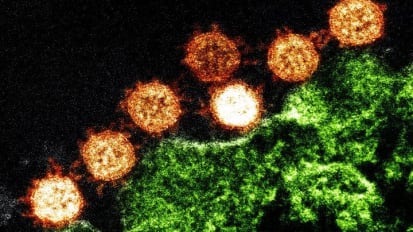Search
 Video
Video
“My Chest Hurts”: How to Assess a Worrisome Symptom in Kids
While most chest pain in children isn’t caused by heart trouble, pediatricians keep patients safe when they ask the right questions and include certain steps in the physical exam. Document
Document
Pediatric Epilepsy
UCSF’s Pediatric Epilepsy Center of Excellence is a trusted resource for physicians who want to ensure expert care for young patients with seizures. Video
Video
Common Spinal Deformities in Kids
This presentation from pediatric orthopedic surgeon Ishaan Swarup, MD, shines a light on the developing spine. Focusing on scoliosis and kyphosis, he offers definitions, classifications, physical exam and testing pointers, treatment options and associated outcomes, and tips on when to refer. Video
Video
In the Blink of an Eye: Early Detection of Vision Problems in Kids
With age-appropriate tests and tools, primary care providers can identify vision concerns in very young patients before there are lasting effects. Video
Video
Eating Disorders in Adolescents: Know the Signs and How to Proceed
Assessing the eating habits of young patients is tricky, but this presentation from UCSF eating disorder specialists offers an update on diagnostic criteria, tools for detecting a problem, techniques for talking to patients and families, and guidance on referrals. Video
Video
Support for Gender Exploration: Understanding the Pediatrician’s Role
Primary care doctors play a valuable role for young gender-expansive children by providing a safe environment, facilitating discussions and understanding current medical options. Our pediatric endocrinologists provide guidelines and answer common questions on gender care. Video
Video
Troublesome Autism Behaviors: Management Techniques to Help the Whole Family
Acknowledging the challenges of diagnosing autism, pediatric neurologist Jennifer Martelle Tu, MD, PhD, provides clarity on the criteria, then discusses common issues – including digestive, sleep and aggression problems – and which treatments help. Plus: new information on ADHD symptoms in kids with autism. Video
Video
Getting to the Heart of Pediatric COVID: Risks and Signs of Cardiac Issues
UCSF pediatric cardiologist Kishor Avasarala, MD, discusses how pediatricians can ensure appropriate cardiac care for children infected with COVID-19. Video
Video
Skip Surgery for Appendicitis? When and Why It Can Work
While surgery cures an inflamed appendix, some children do well on medical management. This case-based presentation by pediatric surgeon Aaron R. Jensen, MD, MEd, MS, clarifies which patients are candidates for nonoperative plans, factors in the decision-making process, and the pluses and minuses of delaying surgery – or not doing it at all. Video
Video
From Ear to Ear: The Right Plan for Otitis Media Depends on the Child
Common and often painful, otitis media can lead to hearing loss, with consequences for development and learning. Video
Video
Pediatric IBD Update: What Primary Care Doctors Need to Know
Sabina Ali, MD, an expert in pediatric IBD, provides a short yet thorough rundown on this progressive disease, including very-early-onset IBD. Video
Video
Hearing the Young Heart: A Lesson on Pediatric Murmurs
Pediatric cardiologist Michael Brooks clarifies how to distinguish worrisome murmurs from harmless ones, and offers a simple grading method and specific listening tips. Video
Video
Common Problems in Pediatric Urology: Emergency & When to Refer?
This case-based presentation by UCSF Chief of Pediatric Urology Laurence S. Baskin, MD, provides clarity on which conditions are emergencies that need specialty care. Video
Video
From Knees to Toes: Navigating Lower Extremity Pain in Active Young Patients
Athletic kids often need care for pain in the knee, ankle or another part of the lower leg – but when is it worthy of imaging tests or referral? Video
Video
Seeing and Safeguarding the Brain: Advances in Care for Pediatric Epilepsy
New techniques have not only made treating seizures safer but can help kids understand what’s happening in their own brains. Pediatric neurosurgeon Kurtis Auguste, MD, discusses using the latest tools to localize seizure foci, plan and perform procedures, and educate patients. Video
Video
Head Shape
Pediatric Neurosurgeon Dr. Peter Sun and Nurse Practitioner Rebecca Silvers review what normal infant skull anatomy and biology looks like, and discuss the characteristic and causes of abnormal headshape. Video
Video
Quarantine Pediatrics: Practice Challenges and COVID-Specific Care
After a snapshot of pandemic-related challenges in health care delivery, this hourlong update features UCSF pediatric infectious disease specialist Ann Petru, MD, who presents guidelines on managing COVID cases and households Video
Video
Pediatric Specialty Care in the Time of COVID: Managing Blood Disorders and Cancer
Two UCSF pediatric hematologist-oncologists discuss COVID risks for pediatric patients with sickle cell and other blood diseases or cancer. Guidance includes which children need hospitalization, when to give preventive therapies for coagulopathies, and when to delay – or not delay – regularly scheduled treatments. Video
Video
Pediatric COVID: How to Manage Families and Severe Cases
In this video, two of UCSF’s pediatric infectious disease specialists provide an important update. Find out when to suspect MIS-C, a serious syndrome that can affect a child’s heart, and which treatments help. Then learn how to guide families with a positive test on isolation practices and community resources. Video
Video
Pediatric COVID-19: Epidemiology, Transmission, Clinical Presentation, Diagnosis
UCSF pediatric infectious disease specialist, Prachi Singh, DO, provides an update on COVID-19 in California, followed by a briefing on what’s currently known about SARS-Co-V-2 in kids. Know the signs that may look like other diseases, when to test, and the value of PCR versus various types of serologic testing. Document
Document
UCSF Benioff Children's Hospitals Referral Guide
Referral information and specialty care clinic locations and phone numbers News
News
As Mysterious Coronavirus Spreads, An Infectious Disease Expert Explains What You Should Know
A new coronavirus, related to the SARS and MERS diseases that have caused epidemics, has been discovered in China and started to spread. Video
Video
Cardiac MRI and 3D+ Technologies: Transformative Care in Congenital Heart Disease
Cardiac imaging specialist Dr. Shafkat Anwar explains how MRI facilitates better management of patients born with heart defects, while technologies such as 3D printing can improve surgical planning, efficiency, outcomes and training. Document
Document
2019-20 Referral Services Guide
UCSF Health is recognized throughout the world for innovative treatments, advanced technology, collaboration among clinicians and scientists, and a highly compassionate team of patient care providers.


